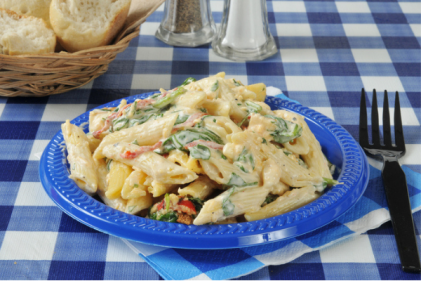Providing a healthy meal for your family is important to every mum. Here are the top 15 nutrients that should be in your family dinner.
- Carbohydrate: The basis of any meal we should always include a carbohydrate rich food at dinnertime. Rice is an excellent source of carbohydrate. Pasta and potatoes are also great carbohydrate options for meals. Sweet potato is a great alternative to potato and is high in fibre and full of vitamin A.
- Protein: We need to include a protein rich food at two or more meals per day. It is a good idea to have a variety of foods that provide protein to get maximum nutrition from your diet. Lean red meat is an excellent source of protein, iron and zinc. It can be a good idea to include red meat two to three times a week in your diet for adequate iron. Chicken is a good low fat source of protein. Avoid eating the skin and try to avoid adding too much fat in cooking. Fish is another important source of protein in the diet. Try to include both white and oily fish. It is recommended that we aim to include oily fish in our diets twice a week. Oily fish include - tuna, trout, mackerel or salmon.
- Plant sources of protein: Pulses including kidney beans, chickpeas, butter beans, soya beans and more are a great low fat source of protein, fibre and iron. The world cancer research fund recommends that we include plant sources of protein in our diets 3 or more times per week.
- Good Fats: Olive oil contains monounsaturated fats which can lower harmful LDL cholesterol without lowering the beneficial HDL cholesterol
- Calcium: Calcium is one of the most important nutrients for bone health. Good sources include dairy, tofu and tinned fish.
- Vitamin D: Imperative for the absorption of calcium; plays an important role in maintaining good bone health. Considered the sunshine vitamin good dietary sources include oily fish and eggs.
- The ACE vitamins: Vitamin A is in orange and red fruits and vegetables like carrots, tomatoes and peppers and helps fight infection.
- Vitamin C: An antioxidant that builds resistance to infection, aids in the prevention and treatment of the common cold. Strongly coloured vegetables, salads and fruits all provide this immune boosting vitamin.
- Vitamin E: Another immune boosting vitamin that helps protect the heart. Avocado, nuts, seeds and oily fish are good sources.
- Selenium: Works well with Vitamin E to help protect the heart.
- Zinc: Zinc is necessary for a healthy immune system and is great for skin. Meat, dairy nuts and seeds are all good sources.
- Iron: Helps to transport oxygen around the body and is very important for our energy levels and immune system.
- Magnesium: Green vegetables are packed with this; Involved in bone health & helps keep our mood balanced.
- Folic Acid: This is essential for good heart health, and for women of conceiving age. Try to include something green in the diet everyday to get a good daily supply of this vitamin.
- B Vitamins: Help release energy from food, present in different coloured fruits, veg, dairy & oats.
Provided by Aveen Bannon, Consultant Dietician in association with Uncle Bens Begin with Ben.



